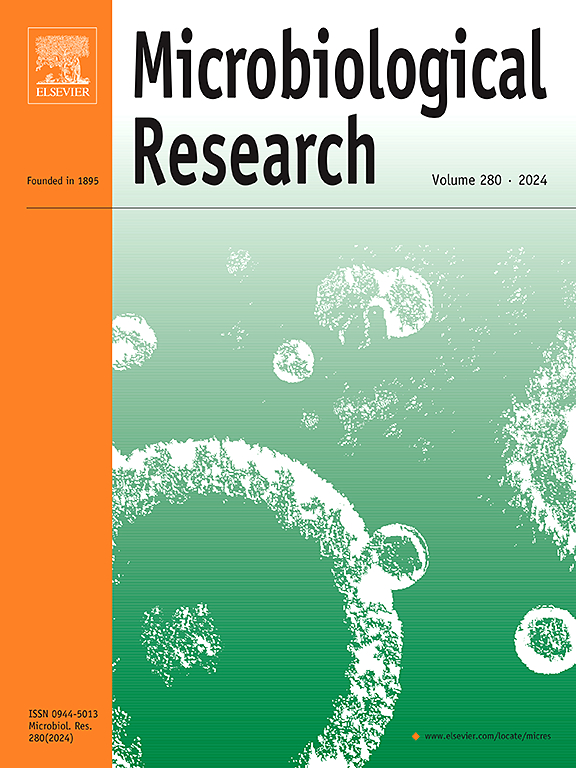促进根瘤菌与豆科植物的共生:应激条件下根瘤菌在激素和营养调节中的作用
IF 6.1
1区 生物学
Q1 MICROBIOLOGY
引用次数: 0
摘要
豆科植物对可持续农业至关重要,因为它们具有通过与根瘤菌共生来固定大气氮的独特能力。最近的研究强调了根瘤内非根瘤菌(NRB)在加强这种共生关系方面的重要作用,特别是在胁迫条件下。这些NRB通过调节植物激素和提高养分利用率,从而促进植物生长促进(PGP)代谢产物,从而改善根瘤的发育和功能。细菌产生必要的激素,如生长素(吲哚-3-乙酸)、细胞分裂素、赤霉素酸、脱落酸、茉莉酸和水杨酸,以及酶,如1-氨基环丙烷-1-羧酸脱氨酶,这些酶可以减轻乙烯对结瘤的抑制作用。此外,NRB通过溶解磷酸盐、钾、硅酸盐、锌和铁等矿物质来促进养分循环,这些矿物质是有效固氮所必需的。豆科植物与根瘤菌和具有多种PGP代谢物的NRB共接种对植物生长、产量和抗环境胁迫能力具有协同效应。本文强调有必要进一步探索根瘤菌内生菌的多样性及其功能作用,旨在通过改善营养和激素管理来优化豆科植物的产量。了解这些相互作用对于制定可持续农业实践至关重要,这些实践可提高豆科植物与根瘤菌共生的效率,最终促进粮食安全和生态系统健康。本文章由计算机程序翻译,如有差异,请以英文原文为准。
Boosting Rhizobium-legume symbiosis: The role of nodule non-rhizobial bacteria in hormonal and nutritional regulation under stress
Legumes are vital for sustainable agriculture due to their unique ability to fix atmospheric nitrogen through symbiosis with rhizobia. Recent research has highlighted the significant role of non-rhizobial bacteria (NRB) within root nodules in enhancing this symbiotic relationship, particularly under stress conditions. These NRB exhibit plant growth-promoting (PGP) metabolites by modulating phytohormones and enhancing nutrient availability, thereby improving nodule development and function. Bacteria produce essential hormones, such as auxin (indole-3-acetic acid), cytokinins, gibberellic acids abscisic acid, jasmonic acid, and salicylic acid, and enzymes like 1-aminocyclopropane-1-carboxylate deaminase, which mitigate ethylene's inhibitory effects on nodulation. Furthermore, NRB contribute to nutrient cycling by solubilizing minerals like phosphate, potassium, silicate, zinc, and iron, essential for effective nitrogen fixation. The co-inoculation of legumes with both rhizobia and NRB with multiple PGP metabolites has shown synergistic effects on plant growth, yield, and resilience against environmental stresses. This review emphasizes the need to further explore the diversity and functional roles of nodule-associated non-rhizobial endophytes, aiming to optimize legume productivity through improved nutrient and hormonal management. Understanding these interactions is crucial for developing sustainable agricultural practices that enhance the efficiency of legume-rhizobia symbiosis, ultimately contributing to food security and ecosystem health.
求助全文
通过发布文献求助,成功后即可免费获取论文全文。
去求助
来源期刊

Microbiological research
生物-微生物学
CiteScore
10.90
自引率
6.00%
发文量
249
审稿时长
29 days
期刊介绍:
Microbiological Research is devoted to publishing reports on prokaryotic and eukaryotic microorganisms such as yeasts, fungi, bacteria, archaea, and protozoa. Research on interactions between pathogenic microorganisms and their environment or hosts are also covered.
 求助内容:
求助内容: 应助结果提醒方式:
应助结果提醒方式:


